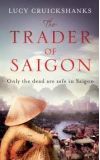
04 Sep 2013 01:50:16
It seems cruel to compare a young first-time novelist like Lucy Cruickshanks with a seasoned professional such as Kate Atkinson's work from last week, but such is the nature of literary prizes.
I can soften the blow slightly by noting that Cruickshanks has plenty of time to go on to better things, and that The Trader of Saigon definitely has its merits. Yet the fact remains that moving from the smooth prose of Life After Life to this novel felt like leaving a rendition by the Berlin Philharmonic for one by a school orchestra. Especially since there were so many bum notes. Most of these lapses came in dialogue, and thanks to an amateur's desire to force emotion and reaction on to her characters.
Elmore Leonard's famous rules for writing are there to be broken, but more attention to rule three ("Never use a verb other than "said" to carry dialogue") would have spared a lot of sniffing, moaning and whimpering – and hopefully stemmed a gushing stream of modifiers: "she said, scowling", she "trembled with excitement", she "wrinkled her nose and frowned". It might also have provoked second thoughts about passages like the following: "Hanh had listened in wonder as her father's words floated out from the field."
Oh, floating words! My own sense of wonder was taking a bit of a battering – and it wasn't just the clumsy prose. Early on, I also had considerable scepticism about the scenario. This focuses on three characters in Vietnam, a few years after the last American helicopters have left Saigon. Alexander is the eponymous trader, an American who abandoned his platoon in the war and now earns a living picking up women to sell as brides and prostitutes. Hanh is an innocent (incredibly innocent!) village girl who collects coins outside a squat toilet and is soon "befriended" by Alexander.
Phuc (brave name!) has fallen on hard times, and needs some extra cash to get local communist party bullies off his back. He takes to gambling in the backstreet dens run by the local gangster boss man, Cheung Hu. And guess what? He loses! Loses in a passage whose crushing inevitability would probably have made me give up on the book entirely if I weren't duty-bound to read it.
But while prizes can be cruel in placing novices under the glare of the spotlight, they do at least give them their chance to perform at their best. If I had given up on the book so early on, I'd have missed out on some reasonably good writing.
Those characters never entirely sprang to life, but even so, Cruickshanks gave them just enough emotional weight to at least support her plot, which became increasingly interesting. Phuc's solutions to his growing list of problems becomes pleasingly ingenious. Where once the action seemed all too obvious, by the end it was full of effective surprises.
This plot was wound increasingly tightly, a ticking clock set in motion to tick so loudly that I stopped hearing most of the infelicities in the prose and kept reading.
So I was reasonably pleased to have perservered. Plenty more things didn't work. I found it hard to believe that Alexander could so easily move through the paranoid postwar Vietnamese state without being noticed by Communist party officials, even if, as the novelist tells us, he was pretending to be Russian. I also had trouble with Cruickshanks' attempts to suggest that Alexander could convince himself there weren't consequences to his crimes, and was developing a conscience.
Finally, I wondered about the setting itself. There was enough talk of rice fields and dirty bars with creaking barstools and jungles and grime to give a surface sheen of authenticity, and recreate the world we've all seen in films such as The Deer Hunter. But it never went deeper than that – I didn't really feel immersed in the complexities of a post-civil war communist society.
Yet there was plenty I did believe in – not least Cruickshank's compassion for the victims of the bride trade, and horror at its consequences. In an author's postscript, she says the novel was inspired by a conversation with a real man she met on a plane who openly bragged about trading in women. Reading that partly made me wonder if she might have written a more interesting book with a contemporary setting, rather than this half-realised Vietnam from 30 years ago. But the passage also confirmed my feeling that there's something authentic behind this book. It isn't polished or even that accomplished, but there is a raw energy that makes it worthwhile.

